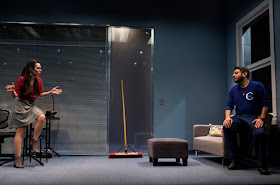This show is spectacular.
Sunday In The Park With George
is a well known and seen musical. Start with a difficult, dissonant score by
Stephen Sondheim and then add a definitive, widely viewed and heard recording
by Bernadette Peters and Mandy Patinkin and you have the recipe for a
disappointing revival. But the show in the newly restored Hudson Theater is the
opposite of disappointing. It borders on revelatory.
 |
| Jake Gyllenhaal and Annaleigh Ashford |
Sunday In The Park With George is a musical about the fanatical
drive of the artist Georges Seurat to create. And, in particular, to create his
masterpiece, A Sunday Afternoon on the Island of La Grande Jatte. Jake
Gyllenhaal inhabits the character of Seurat with a fervor that is masterful and
eloquent - and a voice that handles the score wonderfully. Annaleigh Ashford is
Dot: his muse, lover, model companion and yet a distant second to his art.
This Sunday In The Park With George breaks past of its boundaries
and is a joyful experience. This is a triumph of the actors and director,
because most of the show isn’t about joy, it is about obsession, drive and
containment.
The score mimics Seurat’s use of
pointillism by creating harmony out of distinct notes. In Seurat’s paintings
you have to step back to get the full effect. In this version of Sunday, the
music is somehow less remote. The musical method of hammering single notes,
endemic in the score, is used more sparingly by director Sarna LaPine. Instead,
some of the songs blend the music together allowing the meaning and emotion to
sail through.
And that emotional depth is where Mr.
Gyllenhaal and Ms. Ashford shine extra brightly. Seurat is captive to his art,
expressing through it all of the emotions he cannot otherwise express. Even more
challenging, his art isn’t emotional when you are close to it. You have to
step back and view the whole to see the warmth and love. Mr. Gyllenhaal
captures the love of the artist for his work and the dreams that people will
judge him not by his actions, but by artistic results. And the disappointment when they cannot see what he sees.
In the first act, Seurat draws
and paints a variety of individuals strolling in the park as his relationship
with Dot grows and then grows apart. The vignettes reveal much about of the
repressed and rigid class differences in Paris at the time. Propriety rules
their lives, except for George and Dot. George is ruled by a passion for art,
which can manifest as disinterest in his fellow man. Passion for George, and
life itself, rule Dot. When these two cannot resolve their differences it isn’t
a rejection, but rather an acceptance of their differences, a bittersweet
acceptance.
At the end of act one, these
individual interactions and sketches resolve into the painting as portrayed in
a Tableau Vivant on stage. And then, the beauty and love Seurat had for these
characters and their moments of individuality is obvious. And stunning.
The second act of Sunday takes place in the
present - when a much younger George, perhaps the great-grandson of the painter,
is delivering an artistic installation. Here Mr. Gyllenhaal plays the artist
who has lost the fervor of creating art by the overwhelming pressure to fund art.
It takes a trip back to Paris and the visit of the spirit of Dot to inspire him
again. (And yes, for once, the Chromolune is handled amazingly.)
If you can, go see Sunday In The Park With George.
It is one of those shows people will talk about for years. But be warned it is
still Sondheim, and the people that hate his work won’t be persuaded by these.
(more pictures below - because I loved it)
Sunday
In The Park With George | Music and Lyrics: Stephen Sondheim, Book: James Lapine | Director: Sara Lapine | Cast: Jake Gyllenhaal, Annaleigh Ashford, Brooks Ashmanskas, Jenni Barber,
Phillip Boykin, Mattea Conforti, Erin Davie, Claybourne Elder, Penny Fuller,
Jordean Gelber, Robert Sean Leonard, Liz McCartney, Ruthie Ann Miles, Ashley Park, Jennifer Snachez, David
Turner, Max Chernin, Mayann Hu, Michale McElroy, Jaime Rosenstein, Julie
Foldesi, Laura Irion, Andrew Kober











